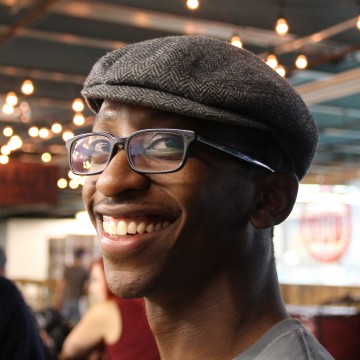Posted in Networks
February 24, 2016
“Network entrepreneurs are keenly aware that they are few among many working across the larger system, and in this way they embody a special type of … leader[ship].”
– Jane Wei-Skillern, David Ehrlichman, & David Sawyer

Image from Taro Taylor – https://www.flickr.com/photos/tjt195/30916171
The concept of leadership has been undergoing an evolution. In this “network age” there appears to be both an expanding appreciation that leadership has always been about more than the singular heroic individual, and that going forward, leadership really must be much more of a shared endeavor.
In our collaborative consulting work at IISC, leadership (or what we often call Facilitative Leadership) is about “holding the whole,” thinking expansively about the state of a given complex system (community, economy, ecosystem, etc.) and paying attention to what will be required to ensure resiliency and/or change for more equitable and sustainable benefit. In these situations, the traditional top-down images of leadership fall far short.
Network leadership is at best a dynamic, diverse, more decentralized and multi-dimensional phenomenon. Many of those with whom we partner at IISC understand this implicitly, and we have found it important to help them be more explicit about this by clearly delineating the roles that leadership can embody in a collaborative/networked change endeavor. Read More
February 9, 2016
“Long term prosperity is primarily a function of healthy human webs.”
– Sally J. Goerner
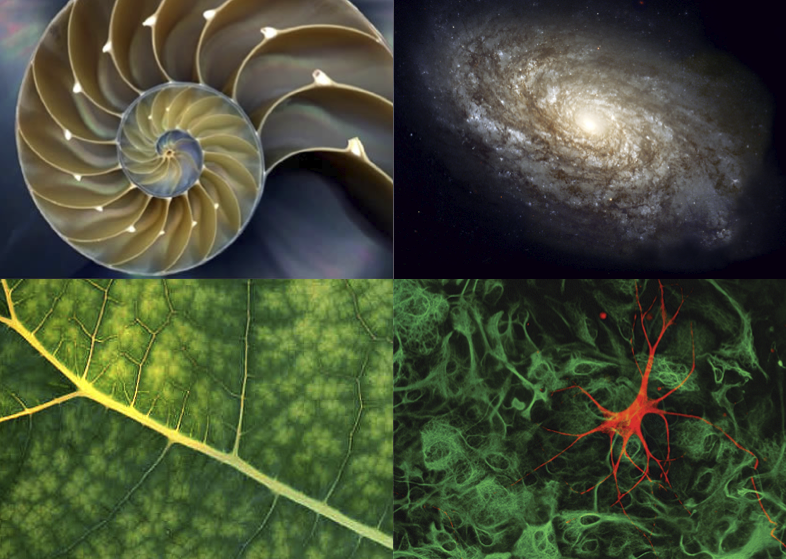
Over the past several years of supporting self-declared “networks” for social change, we at IISC have been constantly evolving our understanding of what is new and different when we call something a network, versus say a coalition, collaborative or alliance. On the surface, much can look the same, and one might also say that coalitions, collaboratives and alliances are simply different forms of networks. Yes, and . . . we believe that what can make a big difference is when participants in a network (or an organization, for that matter) embrace new ways of seeing, thinking, and doing. So let us propose here that network approaches at their best call on people to lead with some of the following:
February 4, 2016
“Grateful living brings in place of greed: sharing; in place of oppression: respect; in place of violence: peace. Who does not long for a world of sharing, mutual respect, and peace?”

The following is a slightly edited re-post from a couple of years ago. The impetus for both the re-posting and editing was a recent conversation on On Being with Brother David Steindl-Rast, Benedictine monk, writer/speaker on the topic of gratitude, and known for his participation in interfaith dialogue and his work on the interaction between spirituality and science.
In a recent interview with Brother David Steindl-Rast, On Being host Krista Tippett introduces the topic of gratitude, by saying that at times it can come across as fairly cerebral or precious without much gravitas. Case in point, writer Barbara Ehrenreich, approaches gratitude with considerable skepticism, seeing it as another “feel good” way to be self-satisfied and unconcerned with the world and people who are suffering and oppressed. Yet Brother David, who has lived through war, the end of an empire, and the fascist takeover of his country (Austria), teaches what he calls “gratefulness” as a deep and important spiritual practice.
Gratefulness in Brother David’s view and experience is not at all superficial, or a practice purely for the privileged. It allows for and leans into the very real anxieties of life, and when invoked in “full-bodied ways” can help prevent those anxieties from becoming disabling fear. Brother David acknowledges the tragedies and injustices of the world, while saying: Read More
January 20, 2016
How focusing on diversity, flow and structure in human networks can be a foundation for great change.
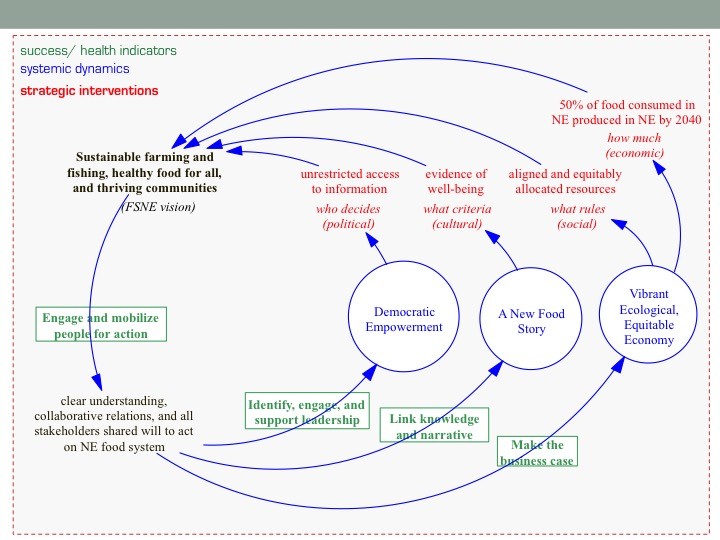
Over the past couple of years, we at IISC have partnered with a few different social change initiatives that have engaged in system mapping to both align diverse stakeholders and surface leverage points for collective intervention. In looking back at these different mapping processes, it is striking the similarities of the areas of focus that have been identified, despite the variety of issues being addressed (food system fragility to educational disparities to public and environmental health). Across these efforts, common areas of leverage have surfaced around:
January 18, 2016
First things first: shoutout to Coretta Scott King for founding the King Center in 1968. Without this institution, we would not have a national holiday celebrating her husband’s life and work.
For the past few years, in honor of Coretta’s wishes and Martin, I’ve been doing a little bit of self-education on Martin Luther King, Jr. Day. Last year, I discovered his speeches were on Spotify so I listened to about 4 hours worth. This year, I’m taking a long look at his Letter from a Birmingham Jail. (Coincidentally, the Letter has always been important to me because he wrote it on my birthday). Read More
January 12, 2016
“Love is essential, gregariousness is optional.”
-Susan Cain

Image by Tom May (www.flickr.com/photos/sleepyhammer/13877245315/sizes/c/)
The following is a slightly edited re-post of something I wrote in early 2014. Since writing this, I continue to see the need to be vigilant around not privileging extroversion in groups, to provide more opportunities to tap a range of cognitive styles to leverage fuller potential in networks.
Having read Susan Cain’s book Quiet: The Power of Introverts in a World That Won’t Stop Talking, I feel both validated (as someone of more introverted tendencies as the years pass) and able to see with new eyes. IMHO, the book is well worth the read, and if the thought of tackling the 300 pages is daunting, you might enjoy a taste via Cain’s TED Talk.
Here I want to reflect on some of the insights Cain’s work has to offer collaboration and “net work” for change. Essentially, Cain reminds us of an important element of diversity that we should not overlook in our change efforts – different cognitive processing styles and ways of responding to social stimulation. Read More
January 5, 2016

A couple of years ago, I was turned on to the work of Louise Diamond. Diamond has been bringing insights from the dynamics of complex systems to peace building work for many years. Her efforts connect to a growing number of practitioners and thinkers who see the need to approach social change with an ecological and evolutionary mindset. In one of her papers, she extracts some of the “simple rules” that yield core practices for working in this way. Here I have adapted and adjusted some of them in application to network building for change and resilience in food systems. Read More
December 22, 2015
“As long as it remains invisible, it is guaranteed to remain insoluble.”
Margaret Heffernan, from Willful Blindness
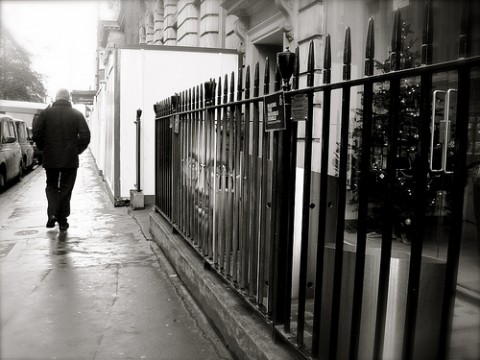
Photo by Marie Aschehoug-Clauteaux
The following is a slighted edited re-post of a piece that appeared at this time last year on our site . . .
As I look back on this past year through the lens of the work we have done at IISC supporting networks and movements for social change, one of the most significant themes from my perspective is the value and importance of “making the invisible visible.” Over the past twelve months, we’ve facilitated many reflection sessions with diverse groups to gauge the development and impact they observe from our work together. I tend to ask people how they see change happening at different levels: self, group, larger systems (organization, neighborhood, community, state, region, etc.). I also like to ask them to reflect via the use of stories to capture and convey significant development.
What has surfaced from this sharing is that even though some of the big goals around equity and sustainability are still ahead of us, there has been movement and part of this development comes down to seeing and being able to work with what had previously been unseen. While the methods for getting to this recognition have varied – from system mapping and analysis to network mapping to structural and power analysis to learning journeys to dialogue and tackling difficult conversations – by creating space to see, share and explore, there has been significant deepening of relationships (to self, other, the work), understanding and commitment.
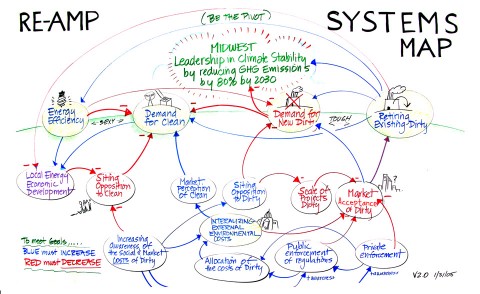
So what is being made visible? Read More
December 15, 2015
“Networks are present everywhere. All we need is an eye for them.”
Albert-László Barabási
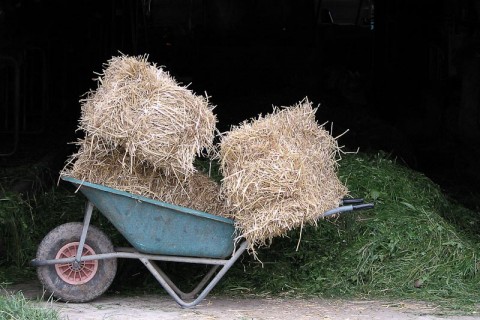
You may have heard a version of this story before:
There was a man who had worked at a factory for twenty years. Every night when he left the plant, he would push a wheelbarrow full of straw to the guard at the gate. The guard would look through the straw, and find nothing and pass the man through.
On the day of his retirement the man came to the guard as usual but without the wheelbarrow. Having become friends over the years, the guard asked him, “I’ve seen you walk out of here every night for twenty years. I know you’ve been stealing something. Now that you’re retired, please tell me what it is. It’s driving me crazy.”
The man smiled and replied, “Okay, wheelbarrows.”
This tale about not seeing something in plain sight reminds me of a dynamic that can ensue in network gatherings where at some point anxiety is expressed about not getting to “concrete” outcomes. This happened recently at a large convening of a national network attempting to set systemic change strategies. Read More
December 11, 2015

The following is Christine Capra’s thoughtful response to my post on “Deepening Network Practice for Social Change.” Christine is a self-described network mapper, weaver, and guardian with Greater Than the Sum. NOTE: Text that is bolded represents my additions and editorial changes to the original.
She writes:
I spend a lot of time pondering the above questions [see post] as well, and appreciate your thoughts here. It’s very helpful.
Re: ‘going beyond abstraction to interaction’, Yes! And even further than interaction – in the past year or so, I’ve developed a deep appreciation for something June Holley said to me awhile back – ‘I always say – start with micro-collaborations.’ Read More
December 8, 2015
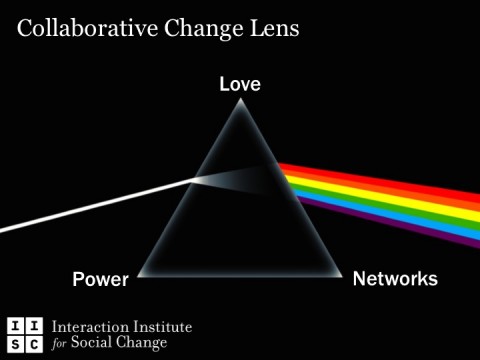
Last week, we held an internal learning session for staff and affiliates entitled “Advancing Equitable Networks.” IISC Affiliate Kiara Nagel and I presented some thoughts about our ever evolving practice of supporting network development for social change, including situating our current approach in IISC’s mission and vision, and our collaborative change lens (see above), which lifts up the importance of understanding and shifting power dynamics for equitable outcomes, embracing love as a force for social transformation and seeing networks as the underlying infrastructure of change.
We then elicited and shared some questions that are at the growing edge of our network consulting practice, including these three: Read More
November 3, 2015
“The goal is not so much to see that which no one has seen, but to see that which everyone else sees in a totally different way.”
– Arthur Schopenhauer
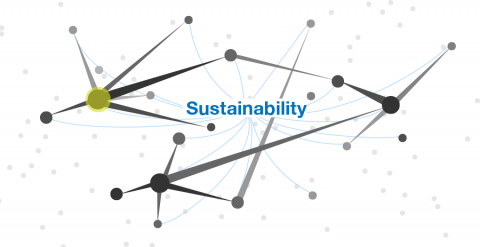
I just finished reading The New Science of Sustainability:Building a Foundation for Great Change, which added depth and nuance to my understanding of the importance of thinking and working in networked ways to create social change. Lead author Sally J. Goerner isScience Advisor to the Capital Institute and lectures worldwide on how the science of “energy networks” can provide measures and an overall narrative for supporting social, economic, and ecological sustainability. Read More





